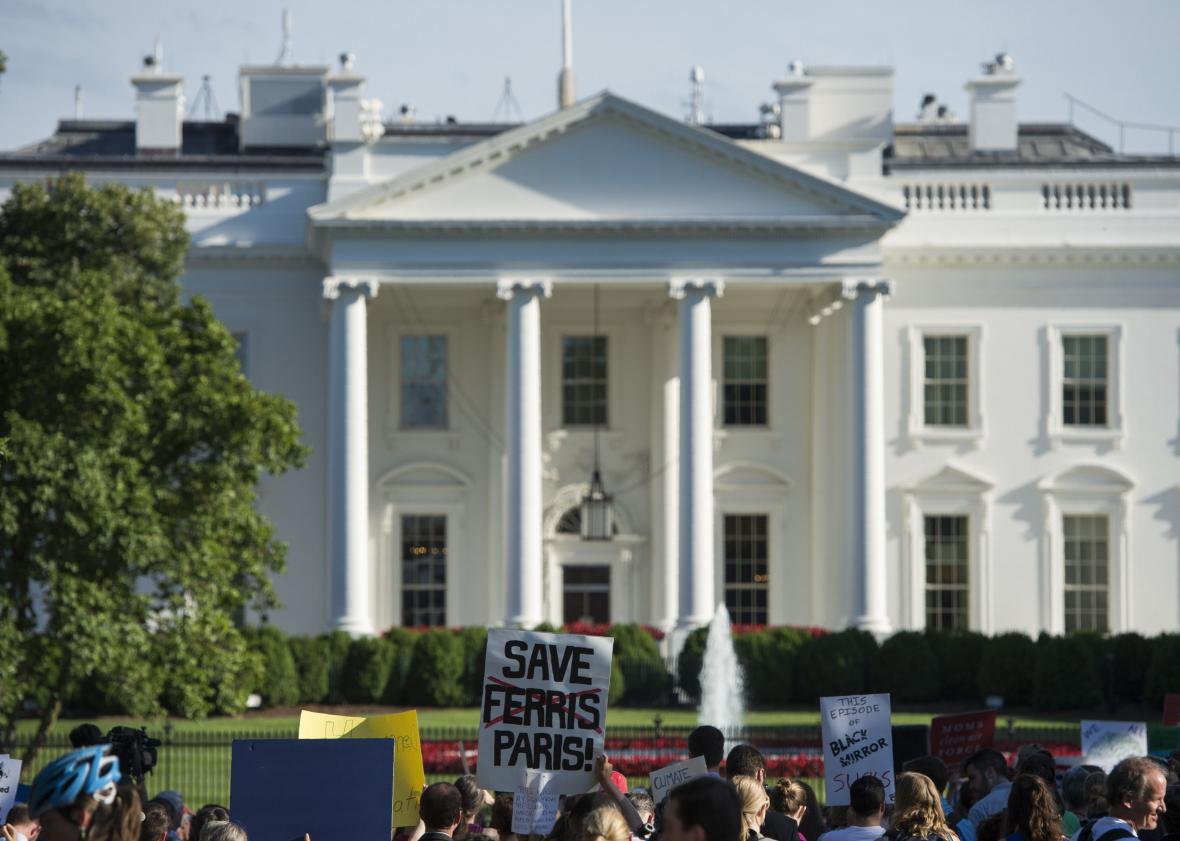Donald Trump formally announced that the United States is leaving the Paris climate change accord on Thursday afternoon. Notably, he did not once use the term climate change during this announcement. In fact, Trump’s justification for leaving the Paris Agreement was devoid of any references to science generally, or more specifically, to any of the reasons why the accord exists in the first place. In a briefing after the speech, someone reportedly asked whether the president thinks climate change is real, and a White House official replied, “Can we stay on topic?”
Why didn’t Trump talk about climate change in his huge speech on climate change? Maybe it’s because he simply doesn’t have a science adviser to fill in those parts of his speeches. Or maybe it was his gift to Ivanka, the “environmentally aware” daughter and adviser who supposedly unsuccessfully urged him to stay in the agreement. (With this, can we finally dispense of the myth that she is a moderating force on the president?) But the most likely reason of all is the simplest: Trump did not even bother to say anything about climate change while withdrawing the United States from the world’s pact to address climate change because he doesn’t think climate change matters.
He doesn’t think climate change matters because he is not governing in the long-term interests of the American people.
Remember, Donald Trump is a short-term-ist, who—typical of a figure that spent most of his career in corporate America—cares very much about short-term profits but very little about the practicalities of ensuring that things work in the long run. Trump devoted the brunt of his speech to his view of the purported economic harms the Paris Agreement is imposing on the United States. “The agreement is a massive redistribution of United States wealth to other countries,” he claimed. “We need all forms of available American energy, or our country will be at grave risk of brownouts and blackouts, our businesses will come to a halt in many cases, and the American family will suffer the consequences in the form of lost jobs and a very diminished quality of life.” Aside from being literal nonsense with no basis in the reality of energy economics, this calculus completely ignores the fact that if we fail to act, there will be massive long-term economic costs associated with climate change. Natural disasters, droughts, and rising sea levels will all cost the American public—and the world at large—quite a bit in the long run. Even corporate America could see how shortsighted this all was.
It is unfortunate how shortsighted the president is, because the government is supposed to be able to take the longer view. Taking the long view to create sustainable solutions to problems—think our interstate highway system, the railroads, or public investment in medical research—is actually good strategy when you have the credit and money to do it, which the United States government does. The Paris Agreement was not perfect, but it at least attempted to start the world down this path. In announcing that he would withdraw, Trump’s message was extremely clear: America is not interested in sacrificing anything, even dead industries, to create a better future. We will not yield. We deserve everything now, later be damned.
This is particularly sad because most Americans actually do want a better future. In March last year, 64 percent of Americans said they were worried “a great deal or fair amount” about climate change, an eight-year high. Seven out of 10 Americans thought we should stay in the Paris Agreement. In general, Americans recognize that things are going south with the environment—69 percent think that climate change is either already harming people or will harm people in the next few years. While some may still have a hard time using the words climate change because of how politicized the science on it has become in this country, programs to increase “resilience”—the new neutral code word for the fight against climate change—are on the upswing.
In the end, as Alex Kaufman noted in the Huffington Post on Wednesday, Trump’s decision elevated his personal ideology above not only what’s right, but what’s popular. Trump’s short-term-ism extends beyond the economic lens to the even shorter-term goal of scoring a political win. “For an embattled president,” Kaufman wrote, “it does do one thing: It fulfills a campaign promise popular with his base.” In fact, immediately after the announcement, Trump sent out an email to supporters with the subject line “Promise Kept—Paris Climate Deal,” accompanied with video of parts of Thursday’s speech, stamped with another big red “promise kept” sign.
Perhaps pulling out will satisfy the egos of certain supporters who see the decision as a victory over “elitist globalists” (his email attacked “the fake news media, Hollywood, lobbyists, and the entire corrupt establishment”). But for America, it accomplishes nothing. It’s a disaster for our foreign relations. It’s an economically backward strategy. And it hurts our standing as a world leader.
In the end, Trump taking America out of the agreement may actually make it easier for the world to fight this battle. Businesses, states, cities, and other countries are already rushing to fill the void left by America’s absence. Trump’s decision, while embarrassing, nonsensical, and painful, may not matter that much in the long run. But in the short term, it’s another stark reminder of the kind of leader America has—a man who places his own personal gain over that of his country.
